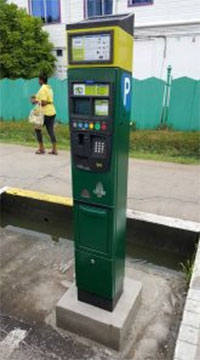LAST WEEK we mentioned that we would have had to revisit the parking meter issue because the Report on that issue done by the Commission of Inquiry (CoI) appointed by the Mayor and City Council (M&CC) had been published. The Guyana Consumers Association (GCA) had submitted a written memorandum to the Commission and would  have expected the Commission to have sent them a copy, or at least to have formally indicated to them that the Report was published.
have expected the Commission to have sent them a copy, or at least to have formally indicated to them that the Report was published.
The Commission failed to do this.
For the entire week, seeing a copy of the Report eluded us. Our last effort was on Saturday, August 26, when we visited the City Constabulary where it was advertised as being available.The Constable on duty informed us that the Report was brought over to their office by an officer from the Town Clerk’s office who kept custody of it and had departed much before noon.
We understand that the Report laid out five or six options ranging from rejection to acceptance of the Parking Meter project but that the Commission, on its part, did not recommend any position.
The Committee of the Guyana Consumers Association whose views are reflected below have totally rejected the Parking Meter Scheme on the following basis:
(1) Smart City, the Mexican Company with whom some members of the City Council had contracted to provide the Parking Meter Scheme, refused to disclose any financial information including investment except the Commission took an oath of nondisclosure of such information. This refusal to provide any financial and accounting information by Smart City emasculated the work of the Commission and was a piece of effrontery, not only to the City Council but to all Guyanese and went counter to the Government of Guyana’s policy on transparency. Smart City thus disqualified itself from doing any Parking Meter project in this country.
(2) In the Contract between Smart City and M & CC, Smart City was allotted 80% of the returns and M&CC 20%. SC would notionally have made an investment of US$10 million while the City Council’s investment would have been the road system of Georgetown worth many billions of dollars, plus the cost of the continuous maintaining of the roads over the next 20 years of the Contract. In other words, Smart City would have invested less than 1% of the cost of the Scheme but would have been collecting 80% of the revenues! Such a giveaway of public funds is unacceptable.
(3) The owners of the Parking Meter Scheme would have been harvesting hundreds of millions of dollars per year which would be sent abroad, causing a constant drain of the foreign exchange of the country. Such a net foreign exchange drain would lead to a weakening of the Guyana currency resulting in increases in prices of goods and services.
(4) The Parking Meter Scheme would have caused businesses great losses. Their customer parking would have been eliminated and the acceptance and delivery of goods at their premises would have become more expensive and time-consuming. Any contraction of business could result in unemployment and increase in prices of some consumer goods. The business community was therefore against the Scheme.
(5) Business in Georgetown would have further dried up since business people and folk from the countryside who usually came to the City to shop and participate in entertainment activity, would find it too expensive to do so and would no longer come.
(6) In the last 15 to 20 years, there has been a great increase of younger wage-earners owning motor-cars unlike in the past where only the well-to-do owned cars. These younger car owners have complained that they could not bear the expense of parking meters and would no longer be able to drive to work. Parking Meters would have created difficult social problems.
(7) The overwhelming majority of the population of Georgetown, as well as the tens of thousands who visit the City every day for business or pleasure, are against parking meters and this fact alone is good enough reason for not trying to impose parking meters on the City.
The traffic congestion in Georgetown occurs in a small area of downtown Georgetown. It occurs along Church Street from Water Street east to Camp Street and the streets going south from Church to Hadfield Street. These streets going south to Hadfield Street are Water Street, Main Street/Avenue of the Republic, King Street, Wellington Street and Camp Street. In Regent Street from Water Street and east to Light Street, there is also unregulated traffic.
The traffic in these streets could be fully controlled and regulated if traffic police and even members of the City Constabulary, are deployed at certain times of the day and certain days of the week when these streets are busy.
To compare Georgetown to New York or London has no meaning. The social and economic developments of New York and London are completely different from Georgetown. To try to compare downtown Georgetown to those great cities could provide no justification for parking meters here.
At this time in Georgetown’s history, there is no social or economic justification for the imposition of parking meters on the City and the population intuitively are of the same conclusion.




.png)









